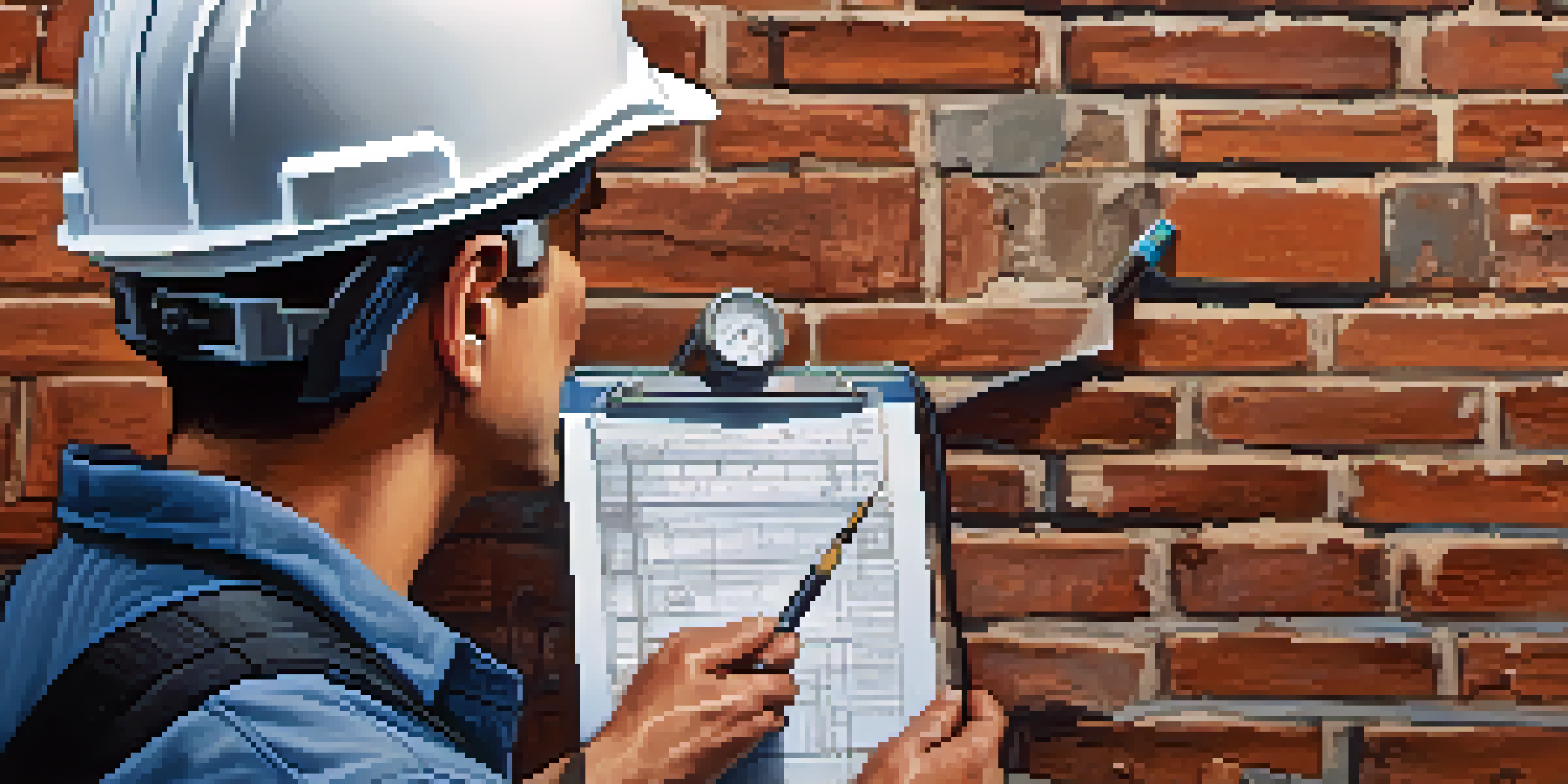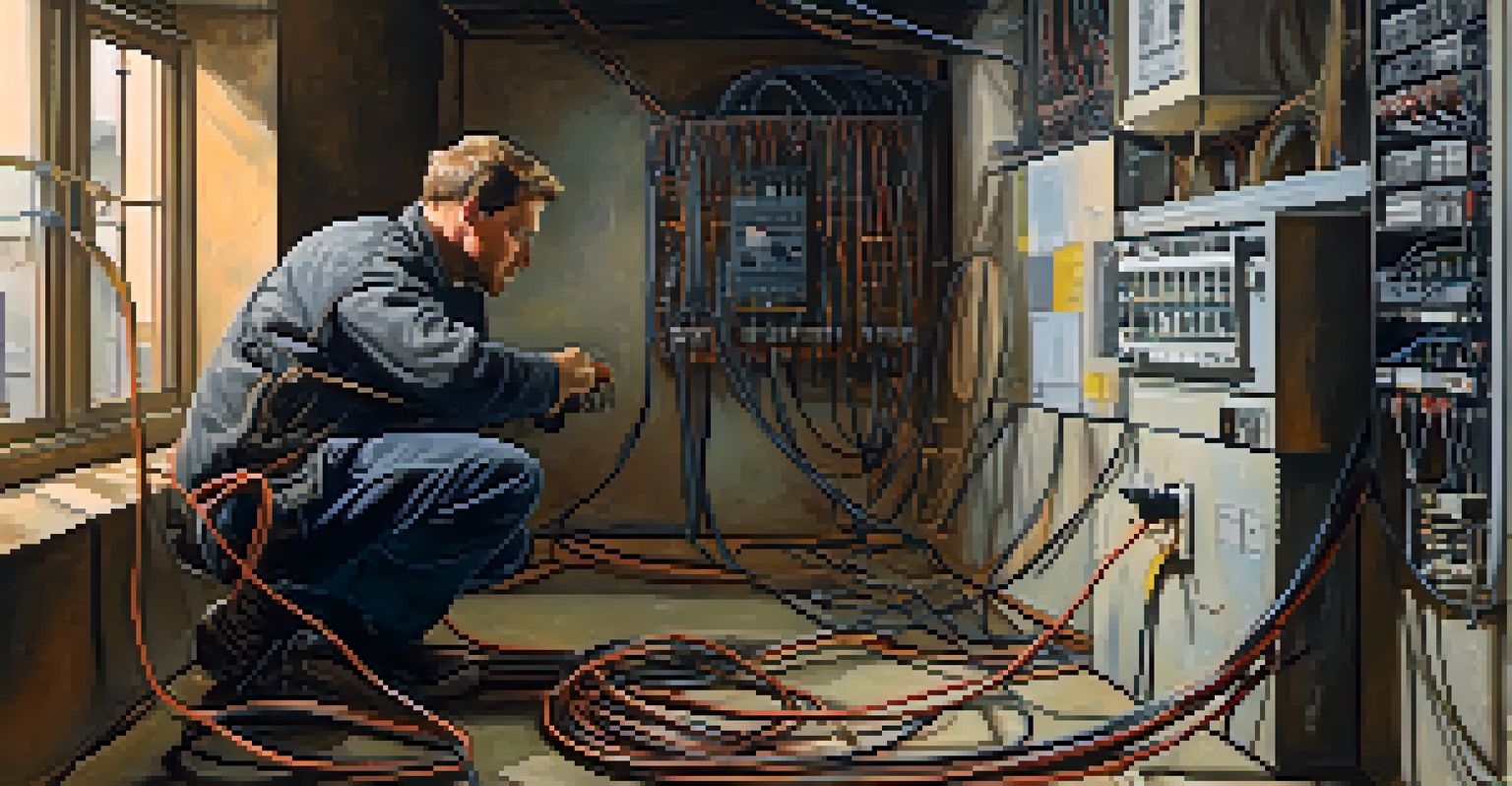Home Inspections: Common Issues Found by Inspectors

Understanding the Role of Home Inspections
Home inspections serve as a vital step in the home buying process. They help potential buyers uncover hidden issues that could lead to costly repairs down the line. By identifying these problems early, buyers can make informed decisions and negotiate repairs or price adjustments with sellers.
A house is made of bricks and beams. A home is made of hopes and dreams.
Inspectors look at various aspects of a home, from the roof to the foundation, ensuring everything meets safety and building standards. This thorough examination provides peace of mind to buyers, knowing they are making a sound investment. It's also a way for sellers to understand the value of their property and address issues before listing it.
Overall, home inspections act as a safety net, allowing both parties to understand the condition of the property. Whether you're buying or selling, having a comprehensive inspection can save you time, money, and stress in the long run.
Common Structural Issues Found in Homes
One of the most significant concerns inspectors often find is structural damage, which can jeopardize the integrity of a home. This includes issues like foundation cracks, sagging beams, and uneven floors. These problems can arise from various factors, including poor drainage, soil erosion, or even natural settling over time.

For instance, a small crack in the foundation may seem insignificant at first glance, but if left unchecked, it can lead to water intrusion and mold growth. Inspectors typically recommend addressing these concerns immediately to prevent further deterioration. Buyers should take these findings seriously, as structural repairs can be costly and complicated.
Moreover, understanding these issues is crucial for both buyers and sellers. If you're selling, addressing structural problems before listing can enhance your home's appeal. For buyers, knowing about potential structural issues can influence your offer and willingness to proceed with the purchase.
Electrical Problems: Safety First!
Electrical issues are another common red flag during home inspections. Inspectors often find outdated wiring, overloaded circuits, or improper grounding, which can pose serious safety hazards. These problems not only affect the functionality of your home but can also lead to electrical fires if not addressed.
The best time to repair the roof is when the sun is shining.
For example, a home built several decades ago may still have knob-and-tube wiring, which is now considered outdated and unsafe. Inspectors typically urge buyers to invest in an electrician's evaluation if they encounter such issues. Ensuring your electrical system is up to code is vital for safety and can save you from future headaches.
In addition, understanding electrical systems can empower homeowners to make informed decisions about upgrades. Whether you're a buyer or a seller, knowing the condition of the electrical system can help you budget for necessary repairs and improvements.
Plumbing Problems: Hidden Risks in Your Home
Plumbing issues are often hidden but can cause significant damage if left unresolved. Inspectors frequently discover leaks, corroded pipes, and inadequate drainage systems during their assessments. These problems can lead to water damage, mold growth, and even structural issues over time.
For instance, a minor leak under the sink may seem trivial, but it can create a damp environment that encourages mold. Inspectors typically recommend regular plumbing checks to catch small issues before they escalate. Buyers should be particularly cautious, as plumbing repairs can be costly and disruptive.
Furthermore, understanding plumbing systems can help homeowners maintain their property better. Regular inspections and maintenance can prevent larger issues, ensuring that your home remains a safe and comfortable space.
Roofing Issues: The Importance of a Strong Top
The roof is one of the most crucial components of a home, and it’s often where inspectors find problems. Common issues include missing shingles, leaks, or signs of poor ventilation. A compromised roof can lead to significant water damage and mold issues if not addressed promptly.
For example, a small leak may go unnoticed until it causes extensive damage to the ceilings or walls inside. Inspectors usually advise buyers to consider the age and condition of the roof when evaluating a property. Replacing a roof can be a major expense, making it an essential factor in the home buying process.
Additionally, understanding roof maintenance can prolong its lifespan. Regular inspections, cleaning gutters, and addressing minor repairs can help homeowners avoid hefty replacement costs in the future.
HVAC Systems: Ensuring Comfort and Efficiency
Heating, ventilation, and air conditioning (HVAC) systems are essential for maintaining comfort in your home. Inspectors often find issues such as outdated systems, poor airflow, or inadequate insulation. These problems can lead to inefficient energy use and increased utility bills.
For instance, an old furnace may still work but could be consuming far more energy than a modern unit. Inspectors typically recommend upgrading to energy-efficient models to save money and improve comfort. Buyers should also inquire about the maintenance history of HVAC systems to gauge their reliability.
Moreover, understanding HVAC systems can empower homeowners to optimize their energy use. Simple actions like changing filters and scheduling regular maintenance can enhance efficiency, contributing to a more comfortable living environment.
Pest Infestations: An Unseen Threat
Pest infestations are another common issue that inspectors may uncover during a home inspection. Problems with termites, rodents, or other pests can compromise the structural integrity of a home and create health hazards. Detecting these issues early can save homeowners from costly repairs and extensive damage.
For example, termites can silently eat away at wooden structures, leading to significant damage before it's even noticed. Inspectors often recommend pest inspections as part of the overall home inspection process to catch these issues early. Buyers should be particularly wary of properties with a history of infestations.

Furthermore, understanding how to prevent pest problems can be beneficial for all homeowners. Regular inspections, proper sealing of entry points, and maintaining a clean environment can help keep unwanted pests at bay.
Final Thoughts on Home Inspections
Home inspections are a crucial part of the real estate process, shedding light on potential issues that could affect your investment. Understanding common problems, such as structural issues, electrical and plumbing concerns, and pest infestations, can empower buyers and sellers alike. Being informed allows for better negotiations and decision-making throughout the buying or selling process.
Moreover, regular maintenance and awareness can prevent many of these issues from arising in the first place. Homeowners who stay proactive about their property often find that minor repairs can save them from significant headaches down the line. Investing in a home is a big decision, and ensuring it’s in good condition is key to that investment.
Ultimately, a home inspection can provide you with the knowledge you need to make informed choices. Whether you're a first-time buyer or looking to sell, understanding the inspection process and common issues can help you navigate the journey with confidence.